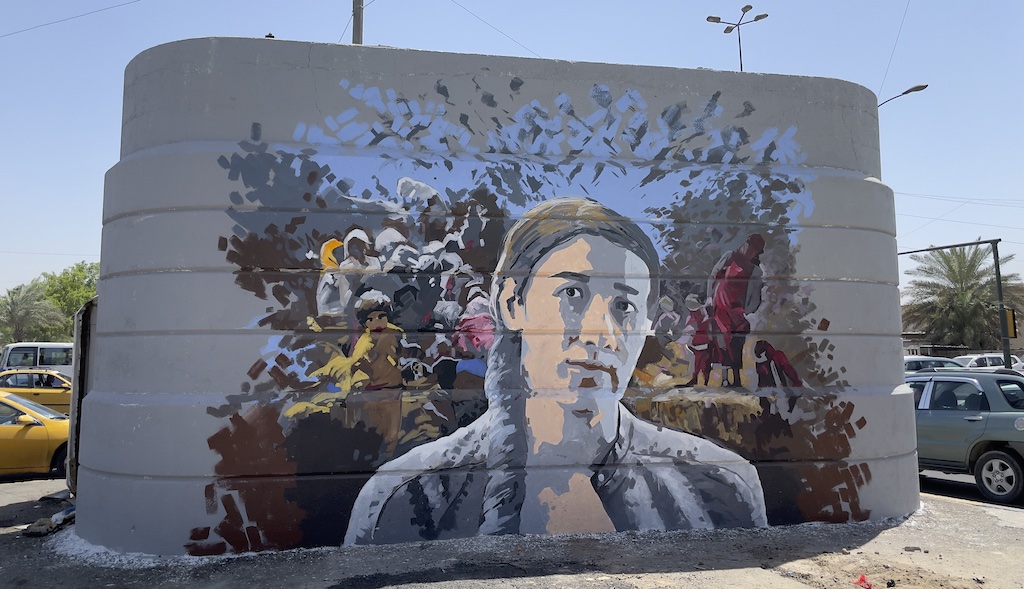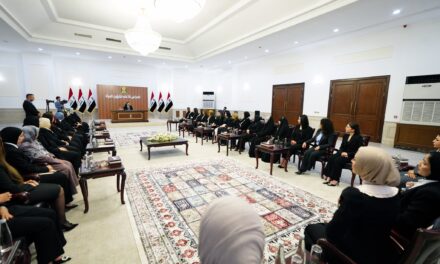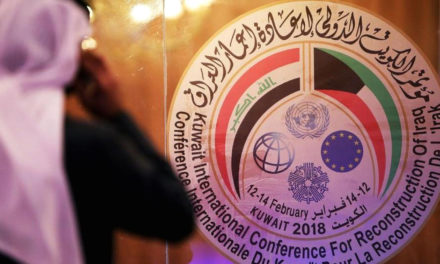(Photo: Public mural of Nobel Peace Laureate Nadia Murad in Baghdad)
August 23, 1921 is the date of the coronation of King Faisal I in Baghdad’s Qushla square, marking the birth of the modern Iraqi state. This August, the Iraqi state will be 100 years old. During this past century, various Iraqi governments and leaders have singled out communities for repression and, unfortunately all too often, for extermination. In every one of those instances, their co-nationals from other communities kept silent and watched, implicating themselves from afar. Their lack of response added to the pain of the victims and created additional challenges to the process of reconciliation and peacebuilding. While certain genocides have been acknowledged by the Iraqi Constitution of 2005, others have been forgotten. Meanwhile, Iraq still witnessed genocides afterwards. Until Iraqis can prioritize the well-being of their co-nationals from other ethnic and religious groups, Iraq will struggle to develop its national identity beyond the flag, borders and languages.
Like a century ago, Iraq continues to struggle to find peace with itself. Even when Iraqi nationality was being built around unifying Arabs and Kurds, it was happening concurrently with the oppression of ethnic minorities, like the 1933 Simele massacre of Assyrians or the 1948 deportation of Jews (and, later in 1969, their public execution). By the 1980s, the state began to prey on larger ethnic groups starting with the program of deportation and execution of thousands of Shi’a and Feyli Kurds accused of Iranian origin. By the late 1980s, Saddam Hussein launched the Anfal genocide against the Kurds. In 1991, the state unleashed brutal retaliations on uprisings in both Shi’a and Kurdish areas, leaving behind mass graves. Historically, the Iraqi state has not been kind to many.
In recent times, it was the state’s incompetence that has led to genocide against Yazidis, Assyrians and Shi’a Turkmen at the hands of Da’ish terrorists in 2014. Arguably, these atrocities stemmed from the failure of politicians to engage in genuine national dialogue and reconciliation concerning historical crimes. This failure drove individuals to seek other means of retributive justice, unfit for a democratizing state, which created resentment among Sunni Arabs. The most difficult part is the continued trauma these communities still hold because their victimization is not acknowledged, rather only politicized. Take, for example, the rush to attribute Nadia Murad’s Nobel Peace Prize to Iraq or exclusively to the Kurdistan Region, when both the governments of Iraq and the Kurdistan Region are complicit in the genocide that created the Yazidi tragedy in the first place. Murad herself dedicated the prize to all Iraqis, in a unifying message. The importance of acknowledging trauma and seeking restorative justice outweighs the importance of selecting a flag, an anthem, or another symbol of superficial inclusivity.
Iraq is a land of ethnic, religious and geographic crossovers. It is diverse, yet difficult to navigate and manage, which is why the Iraqi state has gone through many forms – from monarchy to military rule, to totalitarianism and finally, to an attempt at democracy. However, the difficulties of governing Iraq extend back to the Ottoman Empire, and as described by historian Justin Marozzi: “there was always a fine line between maintaining order and self-defeating severity when governing Baghdad”.
Despite these challenges, the potential of Iraq remains. Unlike many of its neighbours, Iraq’s identity, despite the violent attempts of previous leaders, remains a national one that is not built on ethnicity nor religion. This does not make Iraq an “artificial state” as it is so often called, and as historian Sara Pursley argues, this label itself was used by British colonizers “to argue that Iraq was not yet coherent enough to govern itself”. In fact, the very word “Iraq” predates the formation of the state. That Iraq is and can continue to be an “imagined community” does not invalidate its existence (nor the existence of most states), the only question is how will it imagine this community in the coming century? The possibility to build an Iraq for all still exists and that is what Iraqis should focus on.
The current political class in Iraq is ill-equipped to build an inclusive Iraqi identity as their lives have been shaped by opposition to dictatorship and they have benefited from ethno-sectarian division. Iraq’s unity will have to depend on younger generations, who have, in their language of protest, already redefined nationalism away from identity politics.
While Iraq’s youth are its future, wars and sanctions have disproportionally disempowered them, denying them proper services and education. No amount of nationalism can build a state without the tools that are ingrained through education. The lack of education has left Iraq bereft of leadership and if it is not addressed, it will deprive Iraq of the foundation with which to build the next generation of leaders. Therefore, Iraqis today should focus on improving institutions, particularly the sectors of government that have a direct impact on the everyday life of citizens. This next century must learn from the one positive aspect of the previous century, the focus on building institutions and educating Iraqis.
In these upcoming years, Iraq will need to engage in peacebuilding and reconcile with itself to overcome ethnic and religious divisions. Only after reconciliation and acceptance of one another will a true structure of governance take root, where the powers and responsibilities of governorates, regions and the federal government will be respected by all. The current constitution guarantees the unity and sovereignty of Iraq, but internally Iraq is in a quarrel with itself. How federalism is structured remains disputed and leaves Iraq vulnerable, even after defeating Da’ish. Ideally these issues would have been resolved after 2003 but there was no long-term vision from Iraqi leaders to build a state at the time. However, 100 years later, with so many forms of governance tried, it is high time we try to build an Iraq for all Iraqis.

Alaa Kadhem
Alaa Kadhem is a lawyer and leadership consultant with experience in the Middle East.










